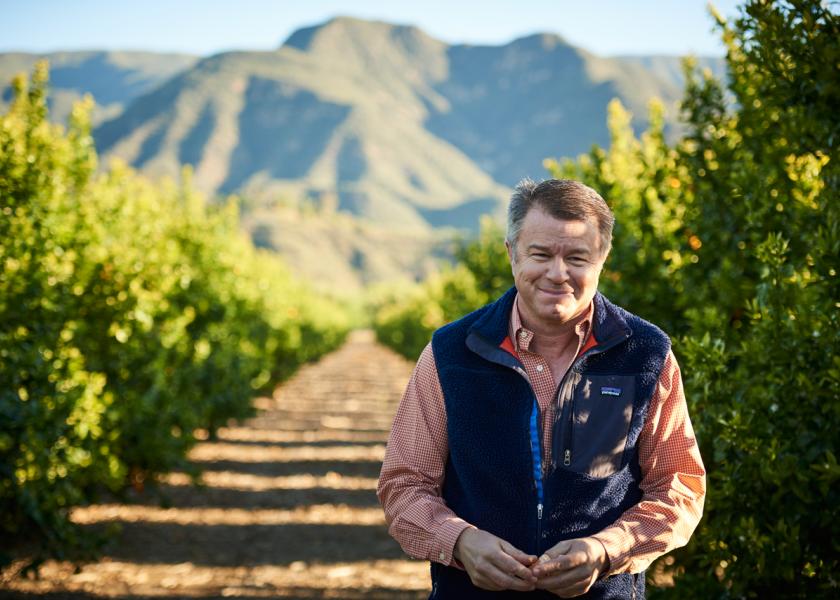California lemon grower raises alarm over Argentina imports

California lemon grower Jim Finch is alarmed about the surge in Argentina lemon imports this year.
Argentina lemon shipments through Aug. 21 totaled 2.72 million 40-pound cartons, according to the U.S. Department of Agriculture, up 62% from 1.68 million cartons a year ago.
The USDA approved imports from Argentina in 2017, and U.S. imports of Argentina lemons have risen from $1.8 million in 2017-18 to $49.8 million in 2020-21.
In an October 2016 economic analysis published before Argentina lemons won access to the U.S., the USDA estimated that U.S. imports of fresh lemon from Argentina were expected to range from 15,000 to 20,000 metric tons annually.
That missed the mark by a wide margin. Recent statistics show volume of Argentina lemons into the U.S. from July 2020 to June 2021 topped 43,000 metric tons, up from about 25,000 metric tons a year earlier.
Shipping point prices for California lemons were $36-44 per carton for 95s, up slightly from $33-40 per carton a year ago. Prices for Argentina lemon imports in Philadelphia were $16-20 per carton on Aug. 25, according to the USDA.
Argentina lemon prices were not reported at the same time last year.
Market changing
Finch, a third-generation Ventura County, Calif., lemon grower based in Ojai, Calif., said his farm typically hits it peak lemon volume in May and then tapers down with shipments from storage for several months. Finch markets his lemons through Sunkist and Wonderful, he said.
The surge in Argentina lemon imports this summer has changed the market window for Ventura lemons, Finch said. Lemons from Ventura County will typically finish by mid-September, but this year supply is expected into October, he said.
Western U.S. lemon supply rotates from the desert to the San Joaquin Valley to Ventura County on the coast, Finch said.
“How any one of us leaves the market affects next guy, which affects the next guy,” he said.
“This will definitely hand the desert growers a very different market because of the market we’re facing currently,” Finch said.
Surge consequences
Argentina’s big increase in volume is troubling, Finch said. Fluctuations in volume of 10% to 20% are not unusual among produce commodities, but he said the dramatic increase in shipments to the U.S. wrecks the market.
While Finch said growers won’t make snap decisions based on one year, current conditions will cause them to carefully consider their future.
The high cost of irrigation water, combined with escalating labor costs, make it difficult for growers.
“We will have to see what next year brings and evaluate (then),” he said.
Finch said California lemon growers could be in a much better position with “even playing fields.”
“I think we are very productive and very innovative and can compete, but when we have more and more regulations and higher costs, it gets harder and harder. A lot of our pickers were making $18-plus an hour, some as high as $25 an hour,” he said. “It gets tough when you’re up against a wage that’s $2 an hour in some of these other countries.”
Consumer preference for U.S. lemons is unclear, he said, and perhaps country-of-origin labeling is not very effective at many supermarkets.
“I’ve talked to several produce managers saying, Hey, your sign up top doesn’t match the sticker on the fruit,” he said, adding the PLU stickers on the fruit have tiny type and are hard to read.
“I can’t read the sticker; it’s too small,” he said. “I can only read what’s published or what’s printed up on the sign in the grocery store; I think a lot of people don’t know (what they are looking) at.”
While lemon acreage had been trending up in the Western U.S. in recent years, the COVID-19 pandemic was a big blow to growers. Since about 55% to 60% sell through foodservice channels, COVID-19 related restrictions on restaurants took a toll last year.
Foodservice demand has since strengthened, but Argentina imports are making life more difficult.
Level up
Finch said he would love to see “something that helps level the playing field” with imports, noting that California growers are concerned that U.S. protection measures against citrus blackspot on Argentina lemons are weaker than those in Europe.
“Europe has different requirements than we do, and that actually holds Argentina to a higher standard than what we hold them to, which bothers me,” he said. “I am very, very concerned.”
Finch said growers are used to evolving and changing, but the surge in imports from Argentina is overwhelming.
“We’ve grown different things over the years, and we have mandarins that we didn’t have at all 20 years ago, he said.
“I have no trouble with the evolution of (what is grown) as agriculture evolves, but it is tough when the playing fields are not quite even.”







